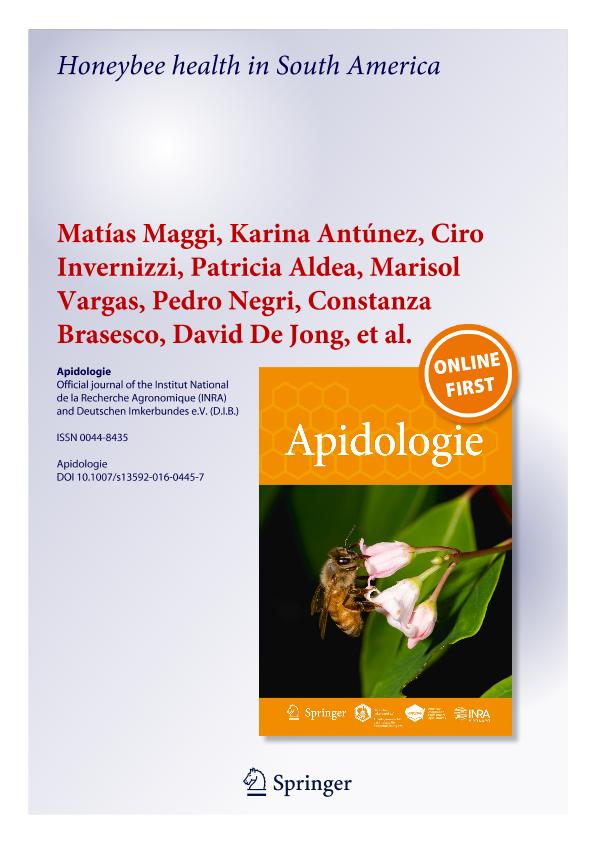Artículo
Honeybee health in South America
Maggi, Matías Daniel ; Antunez, Karina; Invernizzi, Ciro; Aldea, Patricia; Vargas, Marisol; Negri, Pedro
; Antunez, Karina; Invernizzi, Ciro; Aldea, Patricia; Vargas, Marisol; Negri, Pedro ; Brasesco, Maria Constanza
; Brasesco, Maria Constanza ; de Jong, David; Message, Dejair; Texeira, Erica Weinstein; Principal, Judith; Barrios, Carlos; Ruffinengo, Sergio Roberto; Rodríguez Da Silva, Rafael; Eguaras, Martin Javier
; de Jong, David; Message, Dejair; Texeira, Erica Weinstein; Principal, Judith; Barrios, Carlos; Ruffinengo, Sergio Roberto; Rodríguez Da Silva, Rafael; Eguaras, Martin Javier
 ; Antunez, Karina; Invernizzi, Ciro; Aldea, Patricia; Vargas, Marisol; Negri, Pedro
; Antunez, Karina; Invernizzi, Ciro; Aldea, Patricia; Vargas, Marisol; Negri, Pedro ; Brasesco, Maria Constanza
; Brasesco, Maria Constanza ; de Jong, David; Message, Dejair; Texeira, Erica Weinstein; Principal, Judith; Barrios, Carlos; Ruffinengo, Sergio Roberto; Rodríguez Da Silva, Rafael; Eguaras, Martin Javier
; de Jong, David; Message, Dejair; Texeira, Erica Weinstein; Principal, Judith; Barrios, Carlos; Ruffinengo, Sergio Roberto; Rodríguez Da Silva, Rafael; Eguaras, Martin Javier
Fecha de publicación:
11/2016
Editorial:
EDP Sciences
Revista:
Apidologie
ISSN:
0044-8435
Idioma:
Inglés
Tipo de recurso:
Artículo publicado
Clasificación temática:
Resumen
Honeybees are essential components to modern agriculture and economy. However, a continuous increase in cases of colony losses and colony depopulation are being reported worldwide. This critical situation has put the fragile equilibrium between bees and plants on the edge. As a consequence, several scientists have begun to focus their lines of research on this issue. Most researchers agree that there is no single explanation for the observed colony losses. Instead, these losses result from a synergistic interaction between different stressors. South America is not the exception; several cases of colony losses and colony depopulation were reported by beekeepers throughout the continent, yet no accurate data has been published to date. Therefore, this article attempts to analyze the past and present situation of honeybee health in South America, specifically in Argentina, Chile, Uruguay, Brazil, and Venezuela. Furthermore, it is intended to serve as a comparison to future colony losses, as well as to provide guidance for future hypothesis-driven research on the causes of colony mortality. We evaluate the impact of the main parasites and pathogens affecting honeybee colonies and discuss the role of each with respect to reported honeybee losses. We also contemplate the main challenges that each nation must confront with regards to honeybee health.
Palabras clave:
Apis Mellifera
,
Colony Losses
,
Health
,
South America
Archivos asociados
Licencia
Identificadores
Colecciones
Articulos(CCT - MAR DEL PLATA)
Articulos de CTRO.CIENTIFICO TECNOL.CONICET - MAR DEL PLATA
Articulos de CTRO.CIENTIFICO TECNOL.CONICET - MAR DEL PLATA
Citación
Maggi, Matías Daniel; Antunez, Karina; Invernizzi, Ciro; Aldea, Patricia; Vargas, Marisol; et al.; Honeybee health in South America; EDP Sciences; Apidologie; 47; 6; 11-2016; 835-854
Compartir
Altmétricas



